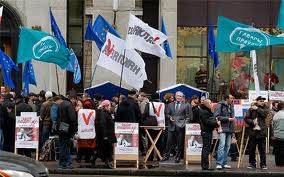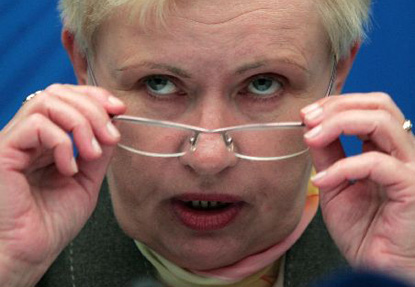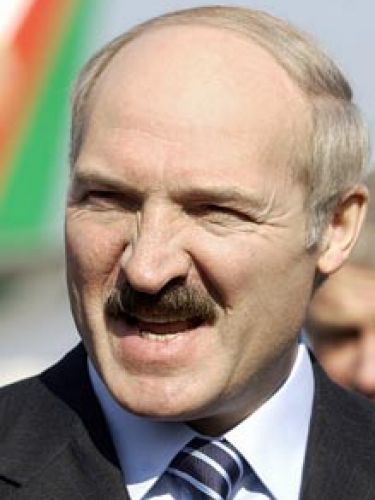A prominent Belarusian analyst in the interview to RFE/RL said that “the key political question today is not who is going instead of Lukashenka after the election, but what will change in the country afterwards.” By giving to political forces and voters a taste of a certain degree of freedom, it will be difficult again to "tighten the nuts and bolts [of the system]." If the regime is handing out political rights and certain, but limited, opportunities to citizens now, later it will be very difficult to take them away. Despite these little signs, the campaign in Belarus is still built on authoritarian principles. The application and use of these rights are not remotely close to what the situation is in truly democratic countries.
 Not forbidden is allowed
Not forbidden is allowed
This year’s presidential campaign in Belarus is run under the slogan "everything which is not forbidden is allowed." Registering of all possible candidates – why not! Using public radio and television for addressing voters and live debates in prime time – easy! Unlike what was the case in the build-up to the 2006 elections, all presidential candidates have had a chance this time to use live TV spots without being recorded and reedited. They said what they thought was important, without being afraid that "wrong" words will be cut. The CEC Chairperson Lidiya Yarmoshyna explained that each candidate has the right to refuse his air time. Coincidentally, only one candidate, the incumbent president Aliaksandr Lukashenka has used this right. The first live television debate is scheduled for 4 December, on radio it will be broadcasted the next day. It is likely that this event will once again be ignored by the president because he has no need of provocative questions from the alternative candidates.
Little victories
Minimal positive changes have been observed in the “paper media” field of the country: some state-run publications are covering of the campaign not just from a one-sided perspective, which over the years has become a tradition. On 25 November the Baranavičy (a major city in Western Belarus) newspaper Naš Kraj published information about a rally of the opposition presidential candidates Yaraslau Ramanchuk and Andrei Sannikau.
 The newspaper reported on a meeting with an alternative candidate on 28 November at the local Palace of Culture. Previously, this particular space, which has about 1000 seats, was not on the list of approved venues for organizing mass meeting of presidential candidates with voters. But after numerous complaints of human rights defenders and representatives of candidates, lists of facilities for electoral meetings were amended.
The newspaper reported on a meeting with an alternative candidate on 28 November at the local Palace of Culture. Previously, this particular space, which has about 1000 seats, was not on the list of approved venues for organizing mass meeting of presidential candidates with voters. But after numerous complaints of human rights defenders and representatives of candidates, lists of facilities for electoral meetings were amended.
As was the case with the definition of places for pickets to collect signatures, local authorities made changes to its earlier decisions, increasing the number of venues for candidates’ rallies. Yet it almost always occurred after a persistent pressure from human rights defenders and political activists.
“Lukashenka does not share an equal playing field with other candidates”” Despite the fact that the current president has refused the opportunity to take advantage of his allocated time to speak on radio and television, his presence in the state media surpasses all other candidates combined. The CEC Chairwoman Lidiya Yarmoshyna, left, animatedly acknowledged it: "Candidate Lukashenka is on an unequal footing with other candidates."
Despite the fact that the current president has refused the opportunity to take advantage of his allocated time to speak on radio and television, his presence in the state media surpasses all other candidates combined. The CEC Chairwoman Lidiya Yarmoshyna, left, animatedly acknowledged it: "Candidate Lukashenka is on an unequal footing with other candidates."
But the broadcasting inequality is only a part of the problem: state-run media in their submissions materials cover opposition candidates in a rather negative light.
Last week, the infamous journalist and a regime propagandist Yuri Prakopau produced a “revelatory” report about the youth organization Young Belarus. The young men were accused of misusing grants, amoral lifestyle; overall, the pro-democracy opposition was presented as marginal and idle groups. Interestingly, Prakopau is rumoured to host and moderate the presidential debate on TV.
 The president Lukashenka himself does not lag behind with his propaganda machine: he has accused several of his opponents of having connections with the Russian Federation. Allegedly they run their campaigns using the Russian money and have intentions to "sell out" to the eastern neighbour. He also claims that none of the nine alternative candidates are to be trusted: "all of their words are nonsense." “Inferiority and vulnerability of each of them are obvious. But what is most important is that we must not let them deceive people,” the head of state noted.
The president Lukashenka himself does not lag behind with his propaganda machine: he has accused several of his opponents of having connections with the Russian Federation. Allegedly they run their campaigns using the Russian money and have intentions to "sell out" to the eastern neighbour. He also claims that none of the nine alternative candidates are to be trusted: "all of their words are nonsense." “Inferiority and vulnerability of each of them are obvious. But what is most important is that we must not let them deceive people,” the head of state noted.
Local experts have no doubt that with the approaching vote date anti-opposition rhetoric of the Belarusian TV and the press will only increase.
Political activism is a health hazard
In addition to moral injuries, some political activists have also been physically injured. In two days, two members of initiative groups of different candidates were assaulted, and it did not look like a mere coincidence.
Unknown persons attacked the presidential candidate’s representative, the Vice-Chairman of the BPF party Ihar Lialkou on 23 November.
Mr. Lialkou was walking out of the entrance of his house when he was unexpectedly punched in the face with some heavy object and lost consciousness. The reasons for the attack are unknown, as all his personal belongings and money remained untouched. Lialkou was transported to a hospital in an ambulance, and doctors stated he sustained an open fracture of his nose and of his left hand.
The next day Valeryia Krauchanka, an activist working for another candidate, was handing out informational materials when an unknown man approached her. He hit the girl several times in the face, and kicked her in the abdomen. After that Krauchanka sought medical assistance in a hospital. Doctors recorded that she had soft tissue and right ear bruises. She wrote a statement about the attack to the local police.
Such cases illustrate quite well the situation in Belarus. On the one hand, there are some positive trends in terms of improved political rights of candidates and voters. On the other, the general atmosphere remains uneven, non-free, built on fear and coercion. For the moment, the two trends co-exist. In the longer term, though, they are incompatible and mutually exclusive. Hence, in the longer perspective, only one of them will prevail.
Based on baj.by, euroradio.fm, spring96.org, charter97.org, BelTA, tut.by





